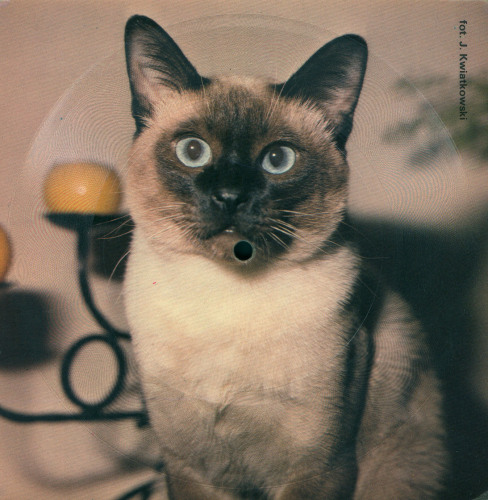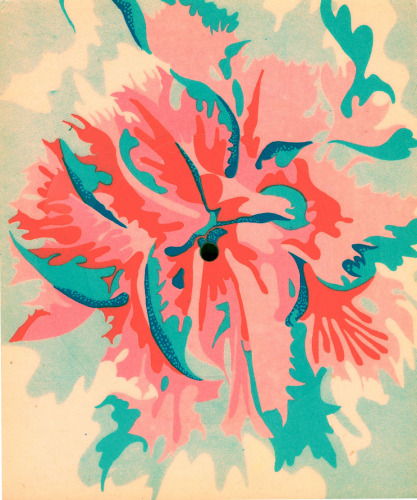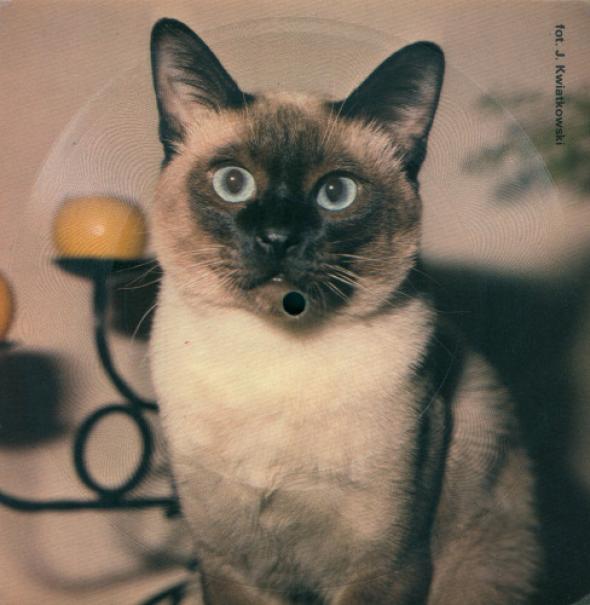Commu-tunes: Music by Mail
Music swapping didn’t used to be as easy as a log on. Technology has made music attainment as simple as breathing, but not every nation’s rise to wires has followed the same path. Communist rule stifled the distribution of albums in Poland in the 60s and 70s, so teenagers made popular their own form of musical exchange: the Pocztowka Dzwiekowa, or Sound Postcard.
As part of the “Fertilizer Festival: Good Shit from Poland”, Rich Mix arts centre features an exhibit from 12 May until 17 May about the plastic laminate postcards engraved with a music track. A simple three-paned exhibit of the sometimes beautiful, sometimes tacky, and always kitschy sound postcards showcases songs and personal messages sent by mail.

info: Photo courtesy of Fertilizer. This postcard of a cat plays Donna Summer's "On the Radio."
“The cards vary from a proper Western hit to Polish tunes”, said Maija Handover, co-director of sounduk, which helps put on the festival. “You’ll even sometimes hear someone who recorded themselves saying ‘Happy Birthday, Grandma’, then it will kick in a Polish medley.”
The exhibit takes us past our own pasts and into the living rooms of the friends we never had: Polish teenagers under Communist control. Musical mail was a way of staying in tune with the West.
Today, the gems sit in dusty crates in Krakow’s flea markets, passed over in favour of second-hand novels and antique mirrors. Mat Schulz, an Australian writer visiting Poland, began collecting the postcards with graphic designer Rui Silva, the exhibit flier says. At first, the two collected the cards based only on what they looked like.
Trees, bright shapes, puppy dogs. The images look like the collection of life’s birthday cards stashed under your bed. Some of the sound cards resemble intricate origami paper with roses weaving in and out of black waves. Others glare like the kind of wallpaper only hotels would dare paste up. Still others feature smiling faces with sun-bleached Farrah Fawcett hair, and the most traditionally Polish ones picture images like two peasant girls spinning on a bridge.
Collectors Schulz and Silva eventually listened to one of the postcards, and then realized the hilarious juxtaposition of sound and sight. There is no logical pairing of the two senses. An image of a big-eyed child wearing a red winter cap and scarf spins to the tune of “For God’s Sake, Give More Power to the People,” a 1971 hit by the Chicago soul group, Chi-Lites.
Three headphone sets let exhibit visitors listen to clips translated into mp3 format. The Hollies’ “Long Cool Woman in a Black Dress”, plays, as well as the Beatles, T.Rex and even a Polish folk song.

info: Photo courtesy of Fertilizer. This Sound Postcard spins to the tune of Mireille Mathieu's "Acropolis Adieu."
Not surprisingly, the music itself is of poor quality. The card plays a mono track, and with all its hissing, it sounds as if you’ve just tormented Snap, Crackle and Pop. There’s something beautiful underneath the noisy flaws. The scratches represent something tangible we’ve lost with ear buds plugged into our brains.
Imagine the teenagers exchanging the colorful plastic rectangles, vying for the “latest hit”, or sitting with their friends, daydreaming about a London concert. Music links worlds, and in the past, we have devoted money to collecting albums and records, and hours to waiting for that favourite song on the radio.
Now, our play lists are entirely personal—both a wonderful sign of our ability to share music, and a frightening realization that the album as a holistic concept is nearly obsolete. These Polish postcards are a link between two times. People collected songs individually, but they still existed in a medium you could hold, share, flip through, swap by hand. Listeners could still carry what they paid for.
Good shit from Poland indeed.
More links to the festival:
Mute Books Orders
For Mute Books distribution contact Anagram Books
contact@anagrambooks.com
For online purchases visit anagrambooks.com







